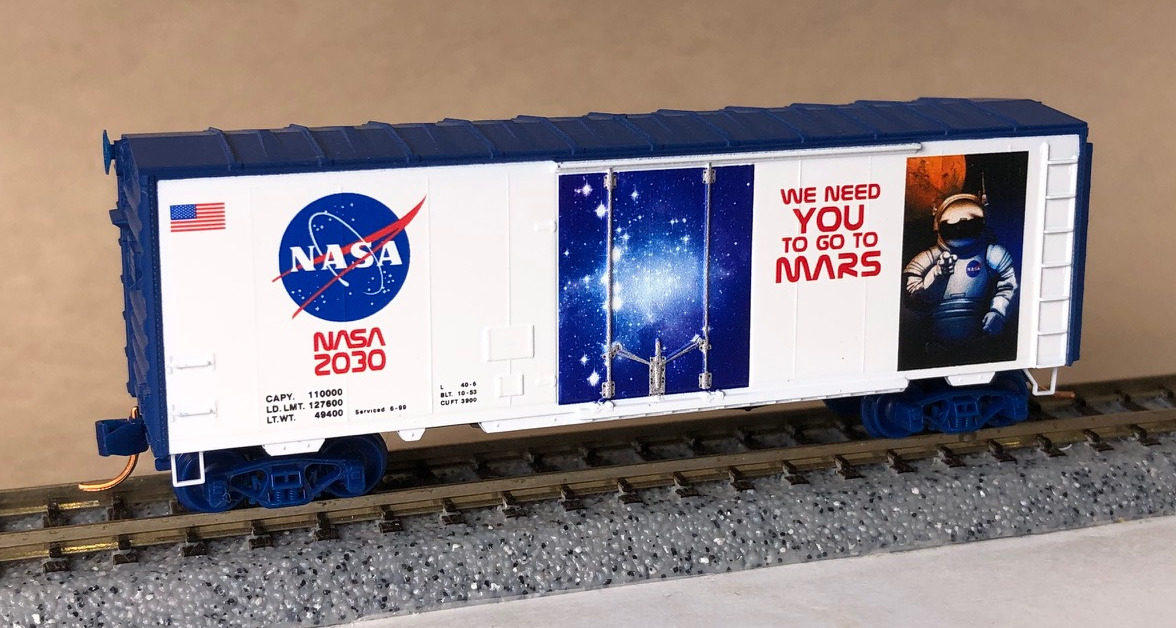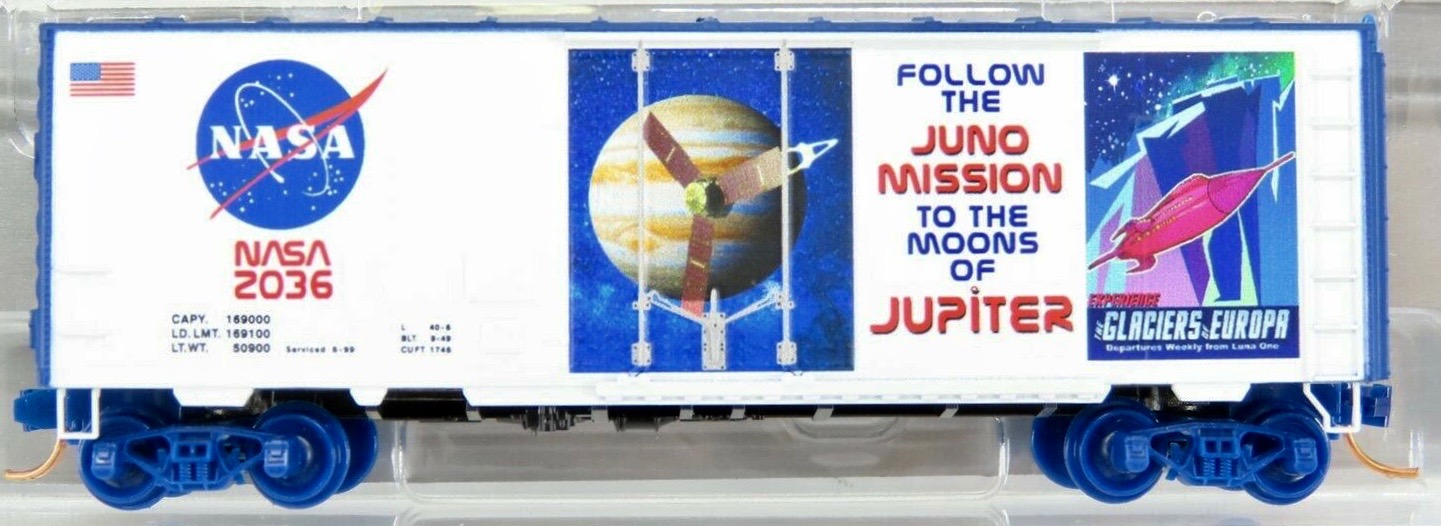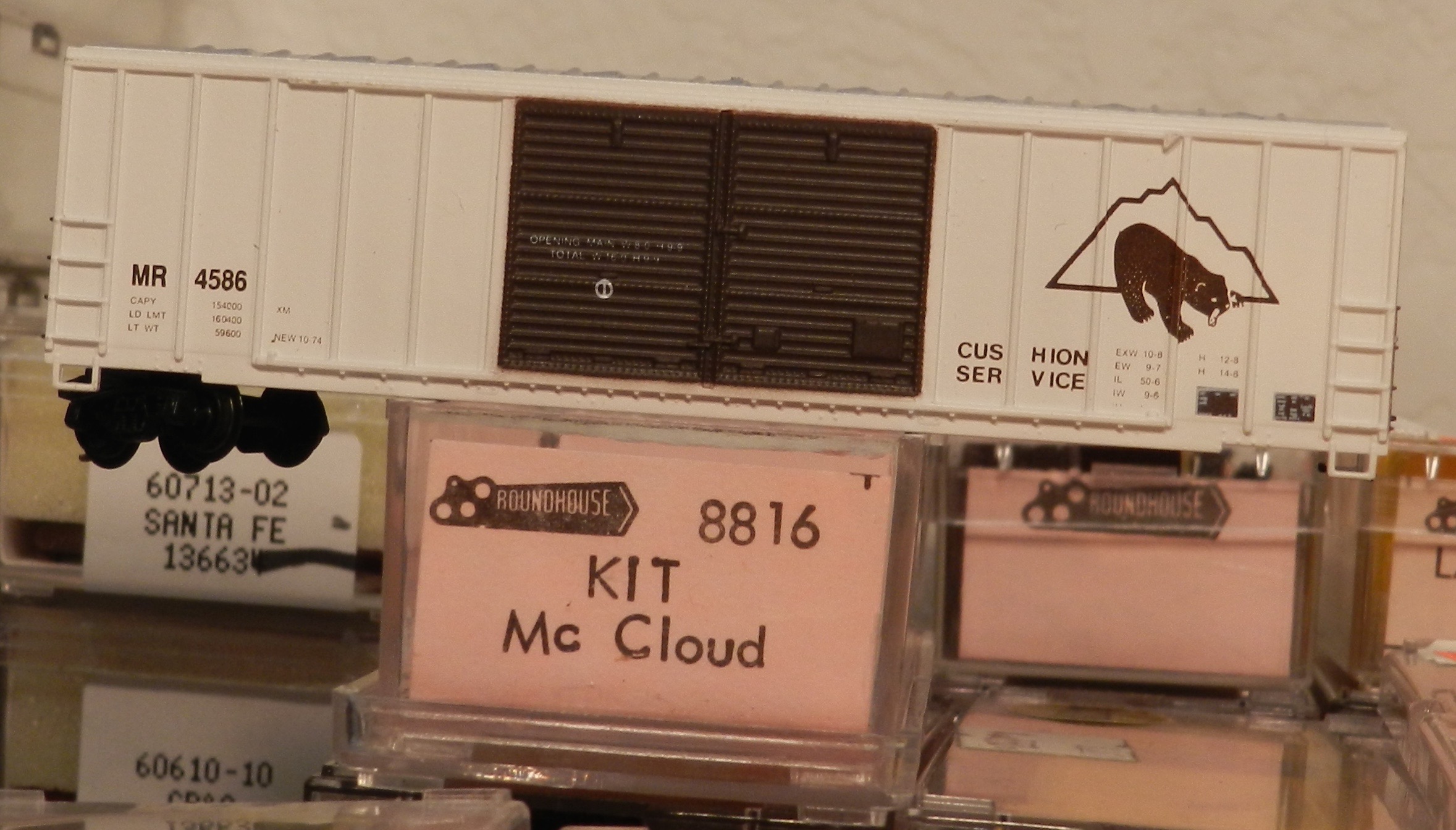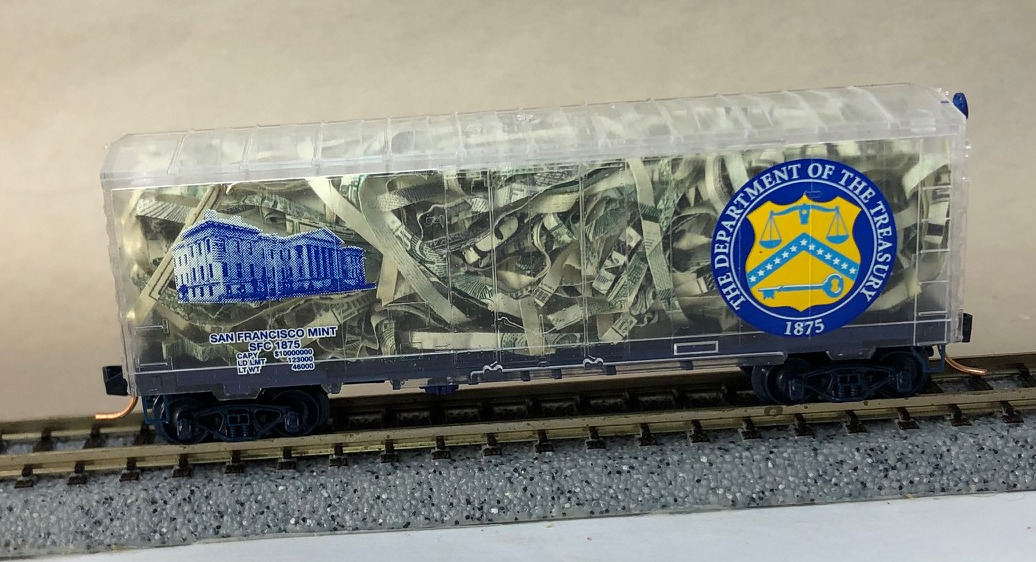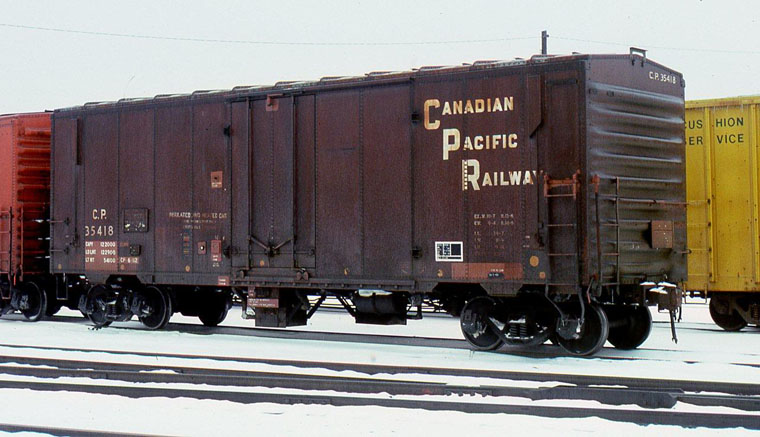Model Information: Model: Introduction: July 1996. This body style (074) has no roof walk and short ladders.
Unlike the traditional "sliding" door, the plug door system closes with a final inward movement (similar to most van sliding doors) that seals the door flush with the interior of the boxcar. This provides a much better seal than the sliding door boxcar. A rotating lever on the door activates a gear system to "plug" and "unplug" the door.
Unlike the traditional "sliding" door, the plug door system closes with a final inward movement (similar to most van sliding doors) that seals the door flush with the interior of the boxcar. This provides a much better seal than the sliding door boxcar. A rotating lever on the door activates a gear system to "plug" and "unplug" the door.
Prototype History: Plug-Door boxcars are usually insulated and typically carry products such as canned goods that require protection from extremes of temperature but do not require refrigeration. Plug-style doors were normally used to ensure a tight seal in the insulation. Designed for transport of both perishables and large loads, plug doors allowed box cars to be sealed from outside dust and dirt. Cars like these were manufactured during the 50s and 60s.
Whether you consider this a reefer or a boxcar is a matter for angel-pinhead-counters. There seems to be a bit of a blurry line during the transition era between the idea of a steel ice reefer and an insulated boxcar. I guess an ice reefer was meant to hold ice for cooling but I doubt this is a cut-and-dry distinction. Modern "mechanical" reefers are a different breed as they contain a refrigeration unit which quite distinctly sets them apart from "boxcars".
Whether you consider this a reefer or a boxcar is a matter for angel-pinhead-counters. There seems to be a bit of a blurry line during the transition era between the idea of a steel ice reefer and an insulated boxcar. I guess an ice reefer was meant to hold ice for cooling but I doubt this is a cut-and-dry distinction. Modern "mechanical" reefers are a different breed as they contain a refrigeration unit which quite distinctly sets them apart from "boxcars".
Road Name History: The National Aeronautics and Space Administration (NASA) is an independent agency of the executive branch of the United States federal government responsible for the civilian space program as well as aeronautics and aerospace research.
President Dwight D. Eisenhower established NASA in 1958 with a distinctly civilian (rather than military) orientation encouraging peaceful applications in space science. The National Aeronautics and Space Act was passed on July 29, 1958, disestablishing NASA's predecessor, the National Advisory Committee for Aeronautics (NACA). The new agency became operational on October 1, 1958.
Since that time, most US space exploration efforts have been led by NASA, including the Apollo moon-landing missions, the Skylab space station, and later the Space Shuttle. Currently, NASA is supporting the International Space Station and is overseeing the development of the Orion Multi-Purpose Crew Vehicle, the Space Launch System and Commercial Crew vehicles. The agency is also responsible for the Launch Services Program (LSP) which provides oversight of launch operations and countdown management for unmanned NASA launches.
From Wikipedia
The NASA Railroad operates 38 miles of track connecting the Kennedy Space Center at Cape Canaveral, Florida to a connection with the Florida East Coast Railroad. Traffic includes fuel, rocket components and other equipment switched in recent years with a trio of ex-TP&W SW1500’s. Traffic fell off considerably with the cancellation of the Space Shuttle program in 2011. NASA’s fleet of liquid helium and liquid oxygen tank cars were loaned to SpaceX in Texas and California. The railroad was inactive between 2013 and 2020 but limited service has resumed as private space launch companies have begun to use the Kennedy Space Center again.
President Dwight D. Eisenhower established NASA in 1958 with a distinctly civilian (rather than military) orientation encouraging peaceful applications in space science. The National Aeronautics and Space Act was passed on July 29, 1958, disestablishing NASA's predecessor, the National Advisory Committee for Aeronautics (NACA). The new agency became operational on October 1, 1958.
Since that time, most US space exploration efforts have been led by NASA, including the Apollo moon-landing missions, the Skylab space station, and later the Space Shuttle. Currently, NASA is supporting the International Space Station and is overseeing the development of the Orion Multi-Purpose Crew Vehicle, the Space Launch System and Commercial Crew vehicles. The agency is also responsible for the Launch Services Program (LSP) which provides oversight of launch operations and countdown management for unmanned NASA launches.
From Wikipedia
The NASA Railroad operates 38 miles of track connecting the Kennedy Space Center at Cape Canaveral, Florida to a connection with the Florida East Coast Railroad. Traffic includes fuel, rocket components and other equipment switched in recent years with a trio of ex-TP&W SW1500’s. Traffic fell off considerably with the cancellation of the Space Shuttle program in 2011. NASA’s fleet of liquid helium and liquid oxygen tank cars were loaned to SpaceX in Texas and California. The railroad was inactive between 2013 and 2020 but limited service has resumed as private space launch companies have begun to use the Kennedy Space Center again.
Brand/Importer Information: Micro-Trains is the brand name used by both Kadee Quality Products and Micro-Trains Line. For a history of the relationship between the brand and the two companies, please consult our Micro-Trains Collector's Guide.
Manufacturer Information:  Micro-Trains Line split off from Kadee Quality Products in 1990. Kadee Quality Products originally got involved in N-Scale by producing a scaled-down version of their successful HO Magne-Matic knuckle coupler system. This coupler was superior to the ubiquitous 'Rapido' style coupler due to two primary factors: superior realistic appearance and the ability to automatically uncouple when stopped over a magnet embedded in a section of track. The success of these couplers in N-Scale quickly translated to the production of trucks, wheels and in 1972 a release of ready-to-run box cars.
Micro-Trains Line split off from Kadee Quality Products in 1990. Kadee Quality Products originally got involved in N-Scale by producing a scaled-down version of their successful HO Magne-Matic knuckle coupler system. This coupler was superior to the ubiquitous 'Rapido' style coupler due to two primary factors: superior realistic appearance and the ability to automatically uncouple when stopped over a magnet embedded in a section of track. The success of these couplers in N-Scale quickly translated to the production of trucks, wheels and in 1972 a release of ready-to-run box cars.
Micro-Trains Line Co. split off from Kadee in 1990 to form a completely independent company. For this reason, products from this company can appear with labels from both enterprises. Due to the nature of production idiosyncrasies and various random factors, the rolling stock from Micro-Trains can have all sorts of interesting variations in both their packaging as well as the products themselves. When acquiring an MTL product it is very important to understand these important production variations that can greatly enhance (or decrease) the value of your purchase.
Please consult our Micro-Trains Collector's Guide

Micro-Trains Line Co. split off from Kadee in 1990 to form a completely independent company. For this reason, products from this company can appear with labels from both enterprises. Due to the nature of production idiosyncrasies and various random factors, the rolling stock from Micro-Trains can have all sorts of interesting variations in both their packaging as well as the products themselves. When acquiring an MTL product it is very important to understand these important production variations that can greatly enhance (or decrease) the value of your purchase.
Please consult our Micro-Trains Collector's Guide
Commissioner Information:  The N Scale Enthusiast Society (previously known as The N Scale Collector until 2011) was established by Wick Brandon, as a sole proprietorship and was a stand alone company until Wick passed away in 2000. The company has been owned by Micro Trains Line since then.
The N Scale Enthusiast Society (previously known as The N Scale Collector until 2011) was established by Wick Brandon, as a sole proprietorship and was a stand alone company until Wick passed away in 2000. The company has been owned by Micro Trains Line since then.
Wick was the founder of TexNRails and he established NSE right after he sold the pioneering N Scale retailer to the Herz family, and the store moved to Florida. Wick and Lea moved their family from Texas to Bakersfield California, and the entire operation was run from his home in Bakersfield. George Johnsen, the current Chairman, came on board as Associate Editor starting with the third issue of the magazine, and the growth of the organization hasn’t stopped. Wick and George did the first convention in Medford in 1993, and added staff and advisors as the organization grew. Wick held the first auction for the NSE in 1995.
The NSE mission statement reads: “This organization is dedicated to the preservation of the history of N Scale Model Railroading, and the railroads they represent.”
They do:
- Special Run Cars
- Regular Auctions of "collectable" Cars
- Annual Conventions
- Bi-Monthly Magazine
Wick was the founder of TexNRails and he established NSE right after he sold the pioneering N Scale retailer to the Herz family, and the store moved to Florida. Wick and Lea moved their family from Texas to Bakersfield California, and the entire operation was run from his home in Bakersfield. George Johnsen, the current Chairman, came on board as Associate Editor starting with the third issue of the magazine, and the growth of the organization hasn’t stopped. Wick and George did the first convention in Medford in 1993, and added staff and advisors as the organization grew. Wick held the first auction for the NSE in 1995.
The NSE mission statement reads: “This organization is dedicated to the preservation of the history of N Scale Model Railroading, and the railroads they represent.”
They do:
- Special Run Cars
- Regular Auctions of "collectable" Cars
- Annual Conventions
- Bi-Monthly Magazine
Item created by: gdm on 2017-05-18 12:14:48. Last edited by Alain LM on 2021-06-06 10:49:07
If you see errors or missing data in this entry, please feel free to log in and edit it. Anyone with a Gmail account can log in instantly.
If you see errors or missing data in this entry, please feel free to log in and edit it. Anyone with a Gmail account can log in instantly.


